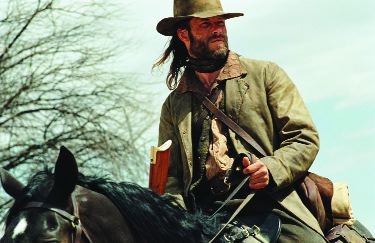Outlaws in the outback

Great westerns have always wrestled with moral issues. John Ford’s The Searchers tackles racism; Howard Hawks’s Red River, loyalty; Sam Peckinpah’s The Wild Bunch, honor; Sergio Leone’s Once Upon a Time in the West, revenge; Clint Eastwood’s Unforgiven, redemption.
The low-budget Australian film The Proposition, directed by the little-known John Hillcoat and written by the celebrated rock musician Nick Cave, may not be in the same league as those (few films are), but it is certainly squatting around the same campfire. It heaps one ethical dilemma on top of another until we are not sure who the good guys are.
The demanding tale plays out in 1880 Australia, in the dusty and fly-infested outback where law and order is just beginning to take hold and bushrangers (Irish outlaws) are clashing with aboriginal people.
The film opens by putting us in the middle of a chaotic shootout, with flying glass and screeching bullets. Members of the notorious Burns gang are being blasted to bits, along with a few prostitutes who were servicing them in their hideout.
Once the smoke clears, we meet the two survivors, Charlie Burns (Guy Pearce) and his teenage brother, Mikey (Richard Wilson), who are being rudely interrogated by the colonial English officer, Captain Stanley (Ray Winstone). Stanley, who clearly understands the ways of the outback, knows that he has reeled in the smaller fish of the gang and not the big catch he is after. So he makes Charlie an offer. If Charlie can find and kill the eldest member of the clan, his bloodthirsty brother Arthur (Danny Huston), Stanley will pardon both Charlie and Mikey. If Charlie can’t (or won’t), Mikey will hang a week later (on Christmas Day).
Thus begins the first of many difficult decisions in the film. Charlie has little desire to kill his older brother, but he feels protective toward the simple-minded Mikey. And we learn that Charlie broke off relations with Arthur after Arthur led a brutal massacre of a ranch family.
A less ambitious film would focus solely on Charlie’s hunt for his brother. The Proposition cuts between Charlie’s surrealistic journey (afflicted by heat and alcohol) and the complex emotional journey being taken by Captain Stanley in his personal and professional life. Stanley has a wife (Emily Watson) who is unable to bear children and longs to be back in England. The head of the town (David Wenham) is a cruel man who brought Stanley to Australia to get quick results with the Burns gang and the annoying aboriginals, who need to be “eliminated.” Stanley also has to put up with a slovenly crew of deputies.
The Proposition is thick with great dialogue and stirring widescreen visuals of the ominous landscape, photographed by Benoit Delhomme. (Just watching the film makes you feel grimy and sticky.) The acting is superb all down the line, with honorable mention going to the always-solid Winstone as the weary soldier suffering an existential crisis, and the grizzled John Hurt as the wonderfully monikered Jellon Lamb, a drunken bounty hunter who quotes Romantic poetry while on the hunt for his prey.
The key performance is given by Huston (son of the director John Huston) as Arthur Burns, a psychotic butcher who is perceived as a mythic figure by the surrounding aboriginals. They believe he takes the form of a dog at night, howling at the moon to keep evil spirits at bay. He is a mesmerizing, terrifying figure (think of a 19th-century Hannibal Lecter).
The Proposition is extremely violent. It includes a flogging scene that gives lie to the concept of justice, and a long, agonizing knife murder that begins with the ominous words, “Now this might hurt . . .”
But beyond the raw brutality is a film that should be celebrated for its numerous shades of gray.





